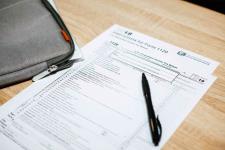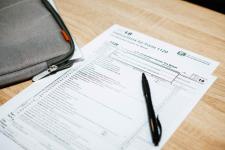Breaking down the cost of selling a house in the UK
When it comes to selling up, and moving house, how many sellers simply take a hopeful best guess at what it’s going to cost?
It’s easy to come unstuck a little further down the line when the correct figures kick into action—so isn’t worth a little forward-planning?
There are plenty of steps and items that get overlooked when it isn’t our area of expertise. However, all is not lost! We’re here to break down the cost of selling a property and provide the all-important checklist for any vendor to work their way through.
Estate agent fees
Conveyancing fees
Provision of EPC certificates
Mortgage adjustments
Removal and storage costs
Preparing to sell
Stamp duty
Capital gains tax
The dangers of a ball-park figure
That hopeful best guess will be based on selling a previous home, or on your friends’ or family’s experiences. As accurate as they were for that property, each move comes with its own complications, price margins and brackets.
For a house in the region of £200–250k, you can look at an outlay of around £5k or £6k. That said, even if the difference in your best guess was £500 or even £1k, could it be enough to impact your budget? One simple missed step could be the factor that sends your figures soaring out of control.
Information is power. Carry out proper calculations and take as much risk as possible out of the process. You’ll be glad you did.
Estate agents fees
Estate agents fees can vary between 1% and 3% of the property sale for a conventional high-street agency. Depending on the value of your property, that can be anywhere from £1,000 to £20,000. It’s a wide margin, and that’s why it’s important to do your research. If you choose a high-street estate agent, research the local rates and what you get for your money.
Are there any hidden extras or bonuses to be had? Do they operate a fixed fee? Or a no sale no fee guarantee?
If you use an online estate agent, you could stand to save a great deal of money, but you’ll also have to do more of the work.
Alternatively, if you do all the work, then you stand to save even more. Choosing which is the best option for you will depend on quite a few factors.
Conveyancing and solicitors’ fees
It depends on the property as to whether it’s better to choose a conveyancer or a solicitor.
Conveyancing is the act of transferring property between owners. In many cases, a conveyancer is more than capable of handling the legal paperwork to fulfil all of your obligations.
A solicitor offers a more general level of legal service. Yet again, in many cases, they are just as equipped to manage the sale and transfer of a property.
Costs will be dependent on the value of the property, its freehold or leasehold status, and whether there’s a mortgage to consider.
The costs for either will likely sit between £500 and £1000. That should include VAT. If you’re preparing to buy at the same time as selling, you could save money by processing both sets of paperwork at the same time.
Provision of an EPC certificate
Every house needs an EPC certificate as part of the selling legislation. It highlights information about the energy efficiency of the property and how its energy costs are managed. It will include suggestions on how to resolve issues or reduce existing costs.
You must hold an EPC certificate before you place a property on the market.
Prices can vary from £35 to £150, and you’ll likely have to add VAT to those figures.
Mortgage adjustments
Easily missed without exploring the paperwork, your mortgage lender can extend a range of charges as:
Exit fees
Early repayment charges
Re-mortgaging costs
Mortgage adjustment fees
Exit fees are the administration costs a lender may apply if you choose to clear your balance. There isn’t always an exit fee, which can be anywhere between £50 and £300, but where there is, it’s designed to cover the work involved in bringing the process forward.
An early repayment charge, typically around 1% to 5%, provides compensation against the lender’s loss of income.
If you decide to rearrange your mortgage to buy your next property, don’t automatically assume that there won’t be a charge. There could be. Even small adjustments could mean changing terms or rates and come at a cost.
Removal and storage costs
To make your home more attractive to buyers, you’d do well to strip out as many of your personal belongings and clutter as possible. Putting it into storage is another often un-prepared-for expense.
When it finally comes to moving out of your sold house—depending on the size of your property and amount of belongings and furniture—it could mean spending anywhere from £200 or £300 for a man and a van, up to a few thousand pounds for an all-inclusive service.
Preparing to sell
Based on the work that needs doing, dictates how expensive this could become. Perhaps it only needs a good scrubbing to get an already-empty property to its prime condition?
If there’s any outstanding maintenance required—now’s the time to do it. You don’t want buyers using additional work required as a bargaining tool, impacting the price.
A complete overhaul on the décor is a big no-no, as most buyers will want to put their own stamp and style on their new home. Creating a clean and fresh blank canvas, however, will go a long way to help sell your home.
Stamp duty
The buyer is responsible for Land Duty Tax, but if you’re moving into a new property, you might want to include yours in your calculations.
Capital gains tax
You may also have to pay capital gains tax if you inherited the property if it’s a buy-to-let or holiday home, business premises or a plot of land.
Capital gains tax can be between 15% and 20% depending on value, income and your status.
Do your calculations – every plan is unique
We’re not kidding. Every evaluation is different. The cost of selling a house in Scotland could differ to those in the UK, as it must include a home report instead of just an EPC. This document includes information about the property, including the Single Survey, the EPC and a property questionnaire.
It could be worth expanding your calculations into the predicted cost of buying and selling a house, to create one, more complete plan. Buying a home is equally challenging, especially when you’re in a position to compare buying an existing property over the cost of self build homes. This has shown to provide a cost-effective alternative in various areas of the UK.
Whatever you’re hoping comes next, you must be prepared with all of the right numbers. Making sure you know what to expect—and what it’s all going to cost—is invaluable.









